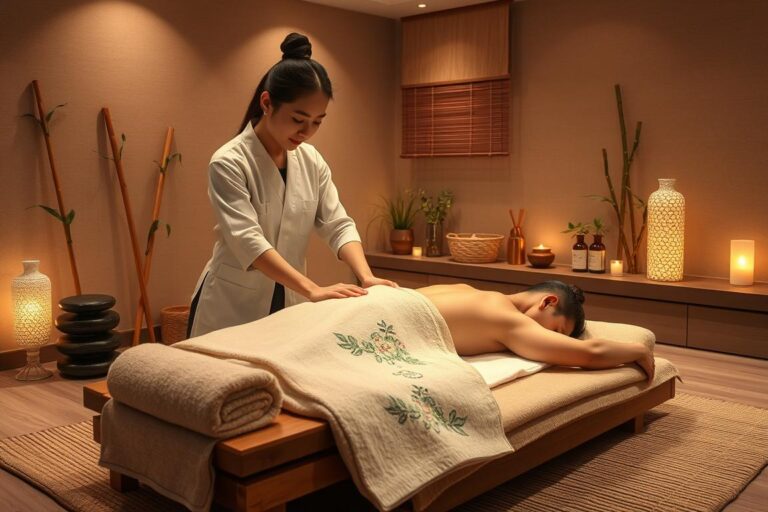Effective Deep Tissue Massage Benefits & Tips
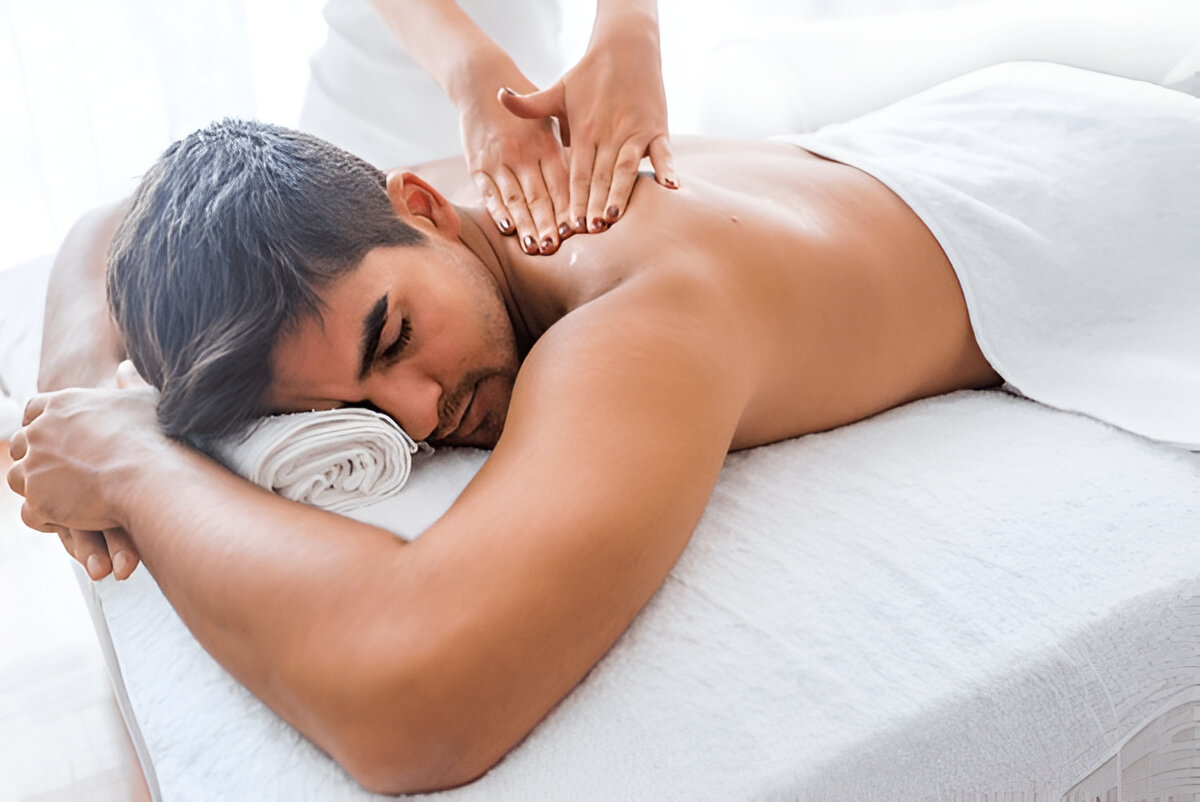
Did you know deep tissue massage is top for treating injuries and chronic pains? It’s different from Swedish massage, which is for relaxation. Deep tissue massage goes deeper, targeting muscle and fascia layers that hold tension.
This article will show you how deep tissue massage helps with pain, improves mobility, and aids in sports injury recovery. You’ll learn about different techniques and tips to make your massage better. This guide is perfect for both new and experienced massage lovers.
Table of Contents
What is Deep Tissue Massage?
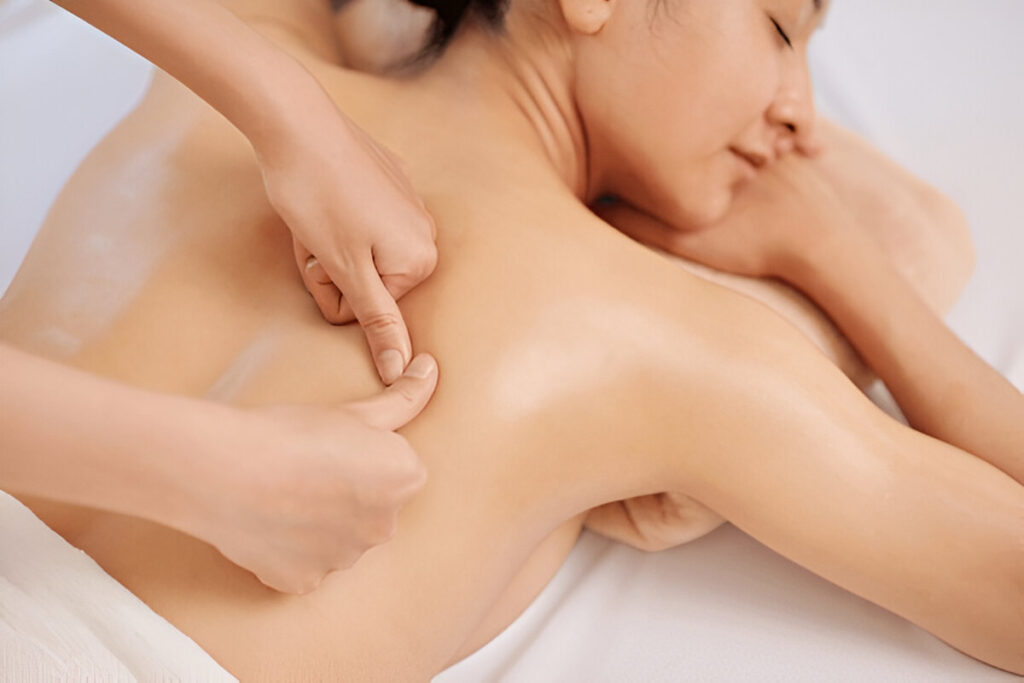
Deep tissue massage is a special therapy that works on the deeper muscles and tissues. It’s different from Swedish massage, which only goes to the surface. This massage uses firmer pressure and slower strokes to fix muscle knots from stress, overuse, or injury.
This massage has many benefits. It can help with pain, improve movement, and boost blood flow. It also helps reduce stress and aid in healing from injuries. A good therapist knows how much pressure to use without hurting you.
Deep tissue massage is great for muscle problems like strains and sports injuries. It can ease long-term muscle pain, better your posture, and increase blood flow. Adding stretching and heat therapy can make you feel even better. Learning more about plantar fibroma massage and its benefits can be very helpful.
Benefits of Deep Tissue Massage
The benefits of deep tissue massage go beyond just feeling relaxed. It targets the deeper muscle and fascia layers. This makes it great for those looking to ease chronic pain. A 2014 study found that deep tissue massages work better than painkillers for chronic pain.
Getting regular massages boosts blood flow. This helps the lymphatic system get rid of toxins. People with burn scars say they feel less pain, itching, and their scars look smaller after massages.
Massages also help with emotional health. Women who got massages during labor felt less depressed, anxious, and in pain. This therapy not only eases physical pain but also calms the mind.
- Improved range of motion and reduced stiffness.
- Enhanced blood flow, particularly beneficial for athletes.
- Better performance, recovery, and injury prevention for physically active individuals.
- Lowered cortisol levels, promoting relaxation.
Deep tissue massage also helps people with arthritis. It makes them feel less pain and strengthens their grip. Athletes find it helps them perform better and feel more relaxed.
With all these deep tissue massage benefits, it’s clear it’s great for both body and mind. For more on treating plantar fasciitis, see foot massagers for effective alleviation.
How Deep Tissue Massage Works
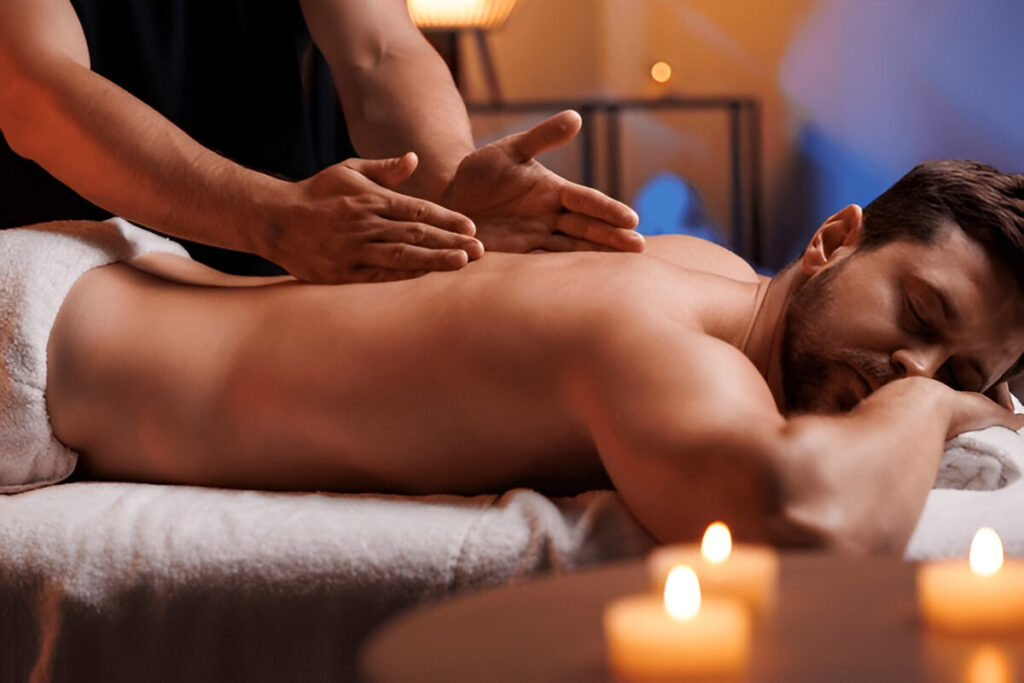
Deep tissue massage uses strong, steady pressure and slow strokes. It reaches deeper muscle and tissue layers. The aim is to fix muscle knots and adhesions from injuries or long muscle tension.
When therapists apply firm pressure, blood flow in the area increases. This helps in faster recovery and less inflammation. Better blood flow also helps in reducing pain and boosting healing.
Conditions like sports injuries, fibromyalgia, and sciatica benefit from deep tissue massage. Some studies show it works as well as pain meds. For example, a study found deep tissue therapy helped with chronic low back pain as much as ibuprofen.
Some soreness might last a few days after a session. But many people notice better movement and flexibility. Remember, deep tissue massage feels like a gentle discomfort, not pain.
Therapists use different methods, like static pressure and friction. They might also use knuckles or elbows for extra strength. This mix helps relax muscles and reduce body tension.
Deep Tissue Massage Techniques
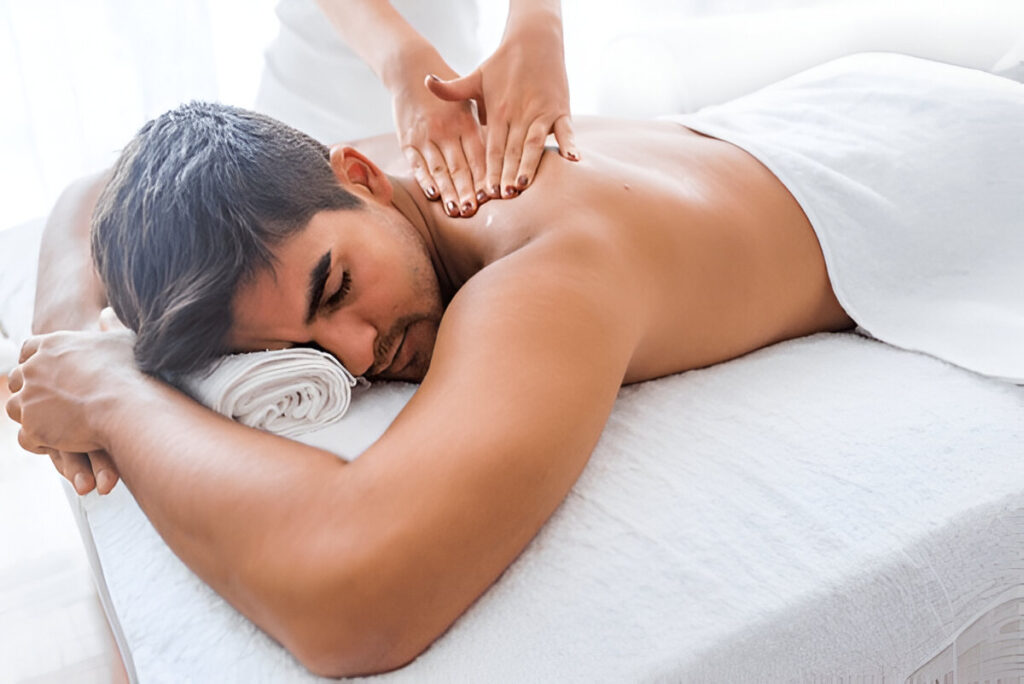
Deep tissue massage is key for easing pain and tension. It uses deep kneading, friction, and muscle fiber stripping. This targets deeper muscles. Therapists use manual therapy to find and fix tight spots.
They use elbow pressure or hands for deeper work. This makes sure tough spots get the help they need.
Trigger-point therapy is also used. It focuses on specific pain points. Stretching and compression add to the benefits, helping both body and mind.
These methods come from ancient times but are now modern. They help improve movement and lessen chronic pain.
A session lasts 60 to 90 minutes. People might feel relaxed or a bit uncomfortable, especially when sensitive spots are worked on. These methods help those with chronic pain, stress, or limited movement.
After a massage, drink water and rest well. Some soreness is normal. It’s part of healing. For more info, visit here.
| Technique | Description | Benefits |
|---|---|---|
| Deep Kneading | Pressure applied to release muscle tension | Relieves chronic pain, increases flexibility |
| Friction | Back-and-forth motion to break down adhesions | Improves circulation, promotes muscle healing |
| Trigger-Point Therapy | Targeting specific painful areas | Reduces localized pain and tension |
| Stretching Techniques | Gently stretching muscles to enhance mobility | Increases range of motion, prevents injuries |
| Compression Techniques | Applying pressure to relax tense muscles | Enhances overall relaxation and stress relief |
Who Can Benefit from Deep Tissue Massage?
Deep tissue massage is great for many people. Athletes get relief from muscle tension and soreness after hard workouts. It helps them recover faster, perform better, and avoid injuries.
Those with back pain or muscle stiffness find it very helpful. It targets tight muscles and eases knots. Many people feel less pain and move better.
Stressed or anxious people also benefit. Deep tissue massage helps them relax deeply. It releases chemicals that make you feel good. It’s great for both your mind and body.
Want to know more about deep tissue massage? Check out this personalized approach to orthopedic care.
Deep Tissue Massage for Athletes

Athletes often choose deep tissue massage to boost their performance and speed up muscle recovery. This massage helps ease muscle stiffness, which is key for moving freely during tough workouts. Studies show it can cut down soreness after exercise and help heal injuries faster.
Sports massage focuses on specific spots, while deep tissue massage works the whole body. It tackles long-term muscle tightness. Both may feel a bit uncomfortable, but they can be adjusted to fit each person’s needs.
Deep tissue massage offers many benefits for athletes:
- Enhanced flexibility
- Improved recovery times
- Injury prevention
- Optimized overall performance
In cities like Denver, athletes who add deep tissue massage to their training see great results. It gets the body ready for big challenges and eases nerves before games. After games, it helps muscles relax and heal faster.
Getting regular deep tissue massages helps avoid injuries and keeps muscles ready for workouts. Talking openly with massage therapists ensures the sessions are safe and work well. This teamwork boosts athlete performance and helps them feel supported.
| Benefits of Deep Tissue Massage for Athletes | Focus Areas |
|---|---|
| Enhanced Performance | Muscle recovery, injury prevention |
| Flexibility Improvement | Areas specific to athlete’s sport |
| Reduced Muscle Stiffness | Full-body tension relief |
| Faster Recovery | Post-exercise soreness reduction |
Addressing Pain Relief with Deep Tissue Massage
Deep tissue massage is great for chronic pain. It works on deeper muscles, helping with arthritis, fibromyalgia, and back pain. It improves blood flow and makes pain less, a good choice instead of usual pain treatments.
Many people find deep tissue massage helps a lot with pain. Each session focuses on the most painful spots. This makes sure the massage fits each person’s needs well.
Studies show deep tissue massage can be as good as some pain medicines. It’s a great addition to chronic pain treatment plans. It helps with muscle knots and makes stiff joints move better.
Drinking water after a massage helps your body heal better. It helps release muscle tension and keeps the massage benefits. People with fibromyalgia find it helps a lot by relaxing muscles and improving blood flow.
| Condition | Benefits of Deep Tissue Massage |
|---|---|
| Arthritis | Reduces pain, stiffness, and improves joint mobility |
| Fibromyalgia | Alleviates widespread pain by relaxing tense muscles |
| Chronic Back Pain | Relieves muscle tension, enhancing mobility and comfort |
| Sports Injuries | Breaks down scar tissue, accelerates recovery |
| Sciatica | Targets hard-to-reach muscle layers for pain relief |
Deep tissue massage is also good for athletes. It helps them recover faster and perform better. Regular use can make people with ongoing pain and mobility issues feel better and more fit. For more tips on using massage for pain, see this guide on foot pain.
What to Expect During a Deep Tissue Massage Session
Starting a deep tissue massage can change your body and mind. Knowing what to expect makes the journey smoother. Before your massage, your therapist will talk with you about your needs and goals. This helps make the massage just right for you.
Initial Assessment with Your Therapist
The first talk with your therapist is key. You’ll share your health history and where you hurt. This lets your therapist plan a massage that meets your needs.
Pressure Sensitivity and Comfort Levels
You might feel different pressures during your massage. Some people like it, while others might feel a bit uncomfortable. Your therapist aims for a good feeling, not pain.
They will ask you how it feels often. This way, they can make the pressure and touch just right for you. This keeps the massage helpful and comfortable.
Knowing what to expect can make you feel more at ease. Your therapist will help you get the most out of your massage. Whether you want to feel less pain or move better, they’re there to help.
Side Effects and Considerations
Deep tissue massage is known for its benefits but can cause deep tissue massage side effects. Some people feel soreness like after a hard workout. A 2007 survey found about 10% of people felt minor discomfort the next day.
It’s important to think about considerations for massage therapy, especially for those with health issues. People with blood clotting problems, fractures, or skin infections should talk to a doctor first. Pregnant women and those getting chemotherapy should also avoid it.
Research shows deep tissue massage can cause more serious reactions. In 2013, Ernst and Posadzki found 18 cases of “moderately severe” reactions. While serious injuries are rare, they can happen.
Knowing about risks like rhabdomyolysis is key. This happens when too much pressure hurts muscles and releases bad proteins into the blood. The number of adults in the U.S. getting massage therapy went from 5% to 8.3% between 2002 and 2007. This shows it’s becoming more popular, but we need to practice safely.
| Type of Reaction | Reported Incidence | Common Issues |
|---|---|---|
| Minor Discomfort | 10% | Muscle soreness, fatigue |
| Moderately Severe Reactions | 18 cases identified | Cervical and spinal issues |
| Adverse Events Reports | 40 reports (2003-2013) | Disc herniation, soft tissue trauma |
People getting deep tissue massage should know about these things. This makes sure they have a safe and good experience. Talking to therapists about what feels right and any health issues helps a lot.
Best Products for Deep Tissue Massage at Home
Choosing the right tools for a DIY deep tissue massage at home is key. There are many options to help with muscle tension. Here are some top picks for massager products that help with muscle relief.
| Product | Description | Price |
|---|---|---|
| Renpho Back Massager with Heat | Heated massage for deep muscle relief. | $400 |
| Mighty Bliss Deep Tissue Back and Body Massager | Affordable option for effective body massage. | $46 |
| Zyllion Shiatsu Back and Neck Massager | Compact design for neck and back comfort. | $60 |
| HoMedics 3D Shiatsu & Vibration Massage Pillow with Heat | Pillow designed for versatile use. | $38 |
| Aletha The Mark Hip Hook | Tool specifically for hip and glute tension. | $199 |
| Renpho Foot-Massager Machine With Heat | Heated foot relief for ultimate relaxation. | $110 |
| HoMedics Shiatsu Deluxe Foot Massager | Shiatsu massage for tired feet. | $39 |
| OPTP Super Pinky Ball | Small ball for targeted trigger point massage. | $8 |
| Lanshin Massager by Acera | Effective tool for muscle tension relief. | $60 |
| Hyperice Hypervolt Cordless Vibration Massager | High-performance massager for deep tissue relief. | $329 |
| Turonic GM5 Massage Gun | Versatile massager with multiple settings. | $190 |
| Theragun Mini | Compact design, powerful performance. | $149 |
| Black+Decker WP900 Random Orbit Waxer/Polisher | Multi-use tool for relaxation and maintenance. | $40 |
| Thera Cane Massager | Unique design for hard-to-reach areas. | $35 |
These massager products meet different needs, with features like heat and vibration. Using these tools at home can greatly help with muscle recovery. Quality products make your DIY deep tissue massage routine more comfortable and satisfying.
Cost of Deep Tissue Massage
Knowing the cost of deep tissue massage helps you make smart choices for your health. Prices can change based on where you are, the therapist’s skills, and how long the session is. On average, expect to pay $80 to $120 per hour.
For shorter sessions, here are some common rates:
| Session Duration | Cost Range |
|---|---|
| 30 minutes | $30 to $65 |
| 60 minutes | $80 to $120 |
| 90 minutes | $90 to $175 |
Looking for affordable massage options? Many spas and clinics offer package deals. These can make each session cheaper. Some health insurance plans might also cover massage therapy, helping with costs.
Specialty massages, like hot stone therapy, start at $85 per hour. Prices can go up at fancy resorts. At-home services usually cost between $100 to $130 hourly.
Deep tissue massage is a health investment. It can help with ongoing pain, like sports injuries or chronic conditions. Regular sessions can be very helpful. For more health tips, check out ways to naturally support sexual health.
Finding Deep Tissue Massage Near You
Start by asking your doctor or friends for deep tissue massage tips. Websites like Booksy help find massage places near you. You can see ratings, prices, and services offered.
Read online reviews to learn about customer happiness. Choose therapists with deep tissue experience. Cities like San Diego and Chicago have many options.
Book at least an hour and a half for your massage. Costs vary from $30 to $80, based on location and therapist skill. For more help, check this resource on finding the right therapist.
FAQ
What is deep tissue massage?
What are the benefits of deep tissue massage?
How does deep tissue massage work?
Who can benefit from deep tissue massage?
Are there any side effects associated with deep tissue massage?
How much does a deep tissue massage typically cost?
What techniques are used in deep tissue massage?
Can deep tissue massage help with athletic performance?
Where can I find deep tissue massage therapy near me?



